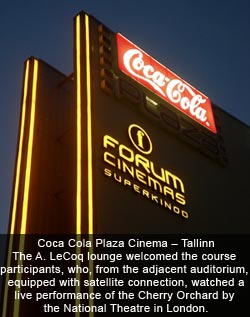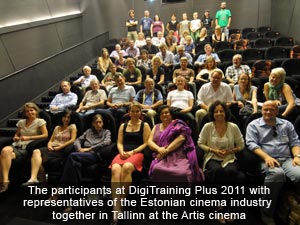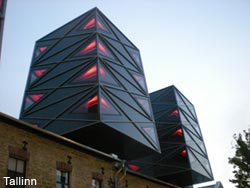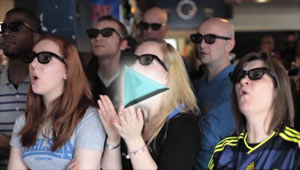
Reg.
Trib. Milano n. 418 del 02.07.2007
Direttore responsabile: Elisabetta Brunella![]()
![]()
International Edition No. 72 - year 6 - 1 July 2011
***
From the eighth
edition of the course
“DigiTraining Plus: European Cinemas Experiencing New Technologies”
Helsinki and Tallinn
29 June - 3 July 2011
- daily update -
 Seventy-four
screens in 49 cinemas for one million, three hundred thousand inhabitants,
a little over two million spectators in 2010, around 140 new titles distributed
each year, four of which domestic: these are the basic figures for the
Estonian cinema world which, presented by Marge Liiske, director of the
Estonian Film Foundation, were the backdrop to the session devoted by
DigiTraining Plus 2011 to digitalization in the small and medium-sized
countries of Europe.
Seventy-four
screens in 49 cinemas for one million, three hundred thousand inhabitants,
a little over two million spectators in 2010, around 140 new titles distributed
each year, four of which domestic: these are the basic figures for the
Estonian cinema world which, presented by Marge Liiske, director of the
Estonian Film Foundation, were the backdrop to the session devoted by
DigiTraining Plus 2011 to digitalization in the small and medium-sized
countries of Europe.Up to the present in Estonia 15 screens have changed to the new technology, most of which are situated in the capital and in leading cinemas which, although few in number, account for over two thirds of total spectators.
Which economic models can be adopted to make sure that the digital transition does not leave any cinemas lagging behind?
An initial reply came from Till Cussmann, who presented the “European version” of Virtual Print Fee proposed by XDC. Clearing the ground of some commonplaces, Cussmann maintains that given certain basic conditions – at least 50 screens presenting upwards of 16 new titles a year plus the involvement of the country’s distributors – VPF can work effectively even for cinemas that give priority to their social and cultural function rather than to a strictly commercial one.
 An
injection of enthusiasm came from Marieke Jonker of Amstelfilm, a Dutch
distribution company that stakes all its odds on its own independence
and innovative ability, operating in collaboration with cinemas that share
the same approach.
An
injection of enthusiasm came from Marieke Jonker of Amstelfilm, a Dutch
distribution company that stakes all its odds on its own independence
and innovative ability, operating in collaboration with cinemas that share
the same approach.“Don’t just digitalize your projection booths, digitalize your company” : this is Marieke’s message and she presented a series of avant-garde tools and initiatives for achieving greater visibility and bigger audiences.
One example is “cinema on demand”, which on the one hand gives spectators a leading role (they can choose which films they want to see on the big screen) and at the same time guarantees the exhibitor’s and distributor’s economic security: the screening will only take place if the number of spectators reached allows them at least to break even.
Emmanuel Joly, representing the European Commission, also argued that digital technologies are a tool for increasing the circulation of European productions.
To facilitate smaller cinemas or those situated in rural areas of Europe, the Commission
 has
developed a support system which will shortly be made public.
has
developed a support system which will shortly be made public.“Keep a close eye on our website over the next few days,” suggested Emmanuel Joly to the course participants, who were joined today by a large number of Estonian cinema professionals.
Amongst them, were the representatives of Tallinnfilm, a vertically integrated cinema company managing the Artissede cinema, the venue for today’s session, and Mati Seppin, who, with his distribution company Estin Film brings ten or so European titles a year to audiences in Estonia.
Programme 1 July
Visit to Cinema Artis, arthouse cinema in the centre of Tallinn.
In collaboration with the Estonian Film Foundation: an information session open to players and exhibitors from the Baltic Republics, chaired by Marge Liiske, Estonian Film Foundation
Presentation of the Estonian cinema landscape, by Lauri Kaare, Forum Cinemas
Digital Cinema in 2011: Trends in Rollout, Financing and Technology, by Michael Karagosian, MKPE
Q&A session
Coffee break
Digitalization: an opportunity or a threat for independent and art house exhibitors, small and medium theatres, exhibition in rural areas?
How digitisation can be an advantage, by Marieke Jonker, Amstel Film
Q&A session
Intervention by the MEDIA Programme,
Emmanuel Joly (European Commission)
Till Cussmann (FTT)
Q&A session
Screening
Afternoon
Visit to the historical city centre of Tallinn
Individual transfers to harbour
Boat to Helsinki
![]()
9.00pm
MEDIA Salles’ contacts and address MEDIA Salles |
